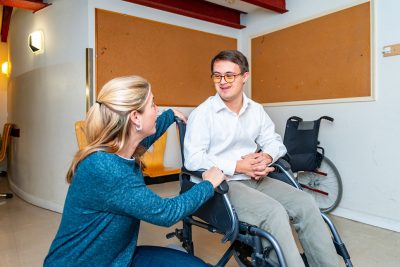
Researchers Are Including People with Developmental Disabilities as Participants and Partners
May 1, 2025
By Stacey Kusterbeck
If clinical trials do not include people with developmental disabilities, this poses multiple ethical concerns. “The intervention being studied may offer less benefit or actually have unexpected adverse side effects in this population, and, so, the drug or device may not be appropriate for the group,” says Edward Kuczynski, director of the Human Research Protection Program at University of California, San Francisco.
Additionally, people with developmental disabilities may have specific unmet health needs that can be addressed by studies that focus on them. “Excluding persons with disabilities is contrary to best practices that ensure a diverse and representative study population so that results are more broadly applicable, and that subpopulation differences in effects or risks might be identified,” says Kuczynski.
Researchers will need to make an additional effort, and make reasonable accommodations in their study designs, to facilitate participation of those with disabilities. “Institutions should provide expert support for their clinical research communities to promote the participation of a diverse research population,” advises Kuczynski. Study teams will need guidance on evaluating the cognitive ability of an individual to provide informed consent and, if necessary, how to obtain consent from a legally authorized representative or legal guardian. Academic medical centers also should provide advice and assistance on arranging a suitable physical environment for those with special needs, adds Kuczynski.
Obtaining input from people with developmental disabilities early, when designing study protocols, can help with recruitment. However, people with developmental disabilities rarely are included in collaborative efforts between community members and scientists. “It is well-established that community engagement positively impacts science. The contributions of community partners strengthen the relevance and validity of scientific goals and methods, build trust between community members and the scientific community, and enhance knowledge translation,” says Katherine E. McDonald, PhD, senior associate dean of research administration and professor of public health at Syracuse University.
If community members with developmental disabilities are not included, researchers will miss out on their potential contributions. Researchers might end up using methods that result in less valid results. For instance, people with developmental disabilities can provide guidance on meaningful patient-reported outcome measures and can identify solutions to barriers to research participation. Without input from people with developmental disabilities, research might focus on questions that are less important to community members. “For example, an intervention that seeks to make neurodivergent people more like neurotypical people might be pursued over ones that address transformations of sensory environments that accommodate neurodivergent people,” says McDonald.
Researchers might have difficulty enrolling people with developmental disabilities because of mistrust or concerns about being scammed. For example, community members may have concerns about whether their data will be used for commercial purposes at odds with their values, such as efforts to enable selection pregnancy termination.
“We may fail to reflect their experiences, values, and perspectives. It would send yet another message to people with developmental disabilities that they are different, incompetent, and not valued,” says McDonald.
Widely used research ethics training is inaccessible to some people with developmental disabilities. This prevents them from taking on some research roles.
“Since scientific discoveries are important to building healthy communities for all, we wanted to make sure more community members with developmental disabilities have the opportunity to collaborate with researchers,” says Ariel Schwartz, PhD, an assistant research professor at the Institute on Disability at the University of New Hampshire.
Universities have requirements for ethics training that any researcher who interacts with research participants must complete. “Lots of people with developmental disabilities struggled with the way these trainings teach people important information about interacting with participants,” says Schwartz. For instance, trainings often use scientific jargon or provide only passive learning, such as reading or watching a video. This may be less accessible for people with developmental disabilities than trainings that integrate opportunities for active learning, such as role plays.
Schwartz and McDonald worked with experts all around the country, including people with developmental disabilities, to create a new training program to teach people with developmental disabilities about their responsibilities when interacting with research participants. The Research Ethics for All training is delivered through active and didactic learning, tailored to the needs of community research partners with developmental disabilities.1 The training covers community-engaged research, history and regulations, recruitment and consent, risks and safeguards, and conflicts of interest, authorship, and researcher safety. “The training removes an important challenge in working with community members with developmental disabilities on research teams,” says Schwartz.
First, researchers must get approval from their Institutional Review Boards (IRBs) to use Research Ethics for All as the required training for community members. Researchers then can include community members with developmental disabilities on the study protocol as members of the research team who will interact with research participants.
“Several research teams around the U.S. have already certified community research partners with developmental disabilities, and received IRB approval,” reports Schwartz.
Reference
1. Schwartz AE, McDonald K; Research Ethics for All Consortium. Research Ethics for All: Development of a social-behavioral research ethics education program for community research partners with developmental disabilities. Disabil Health J. 2025;18(1):101675.